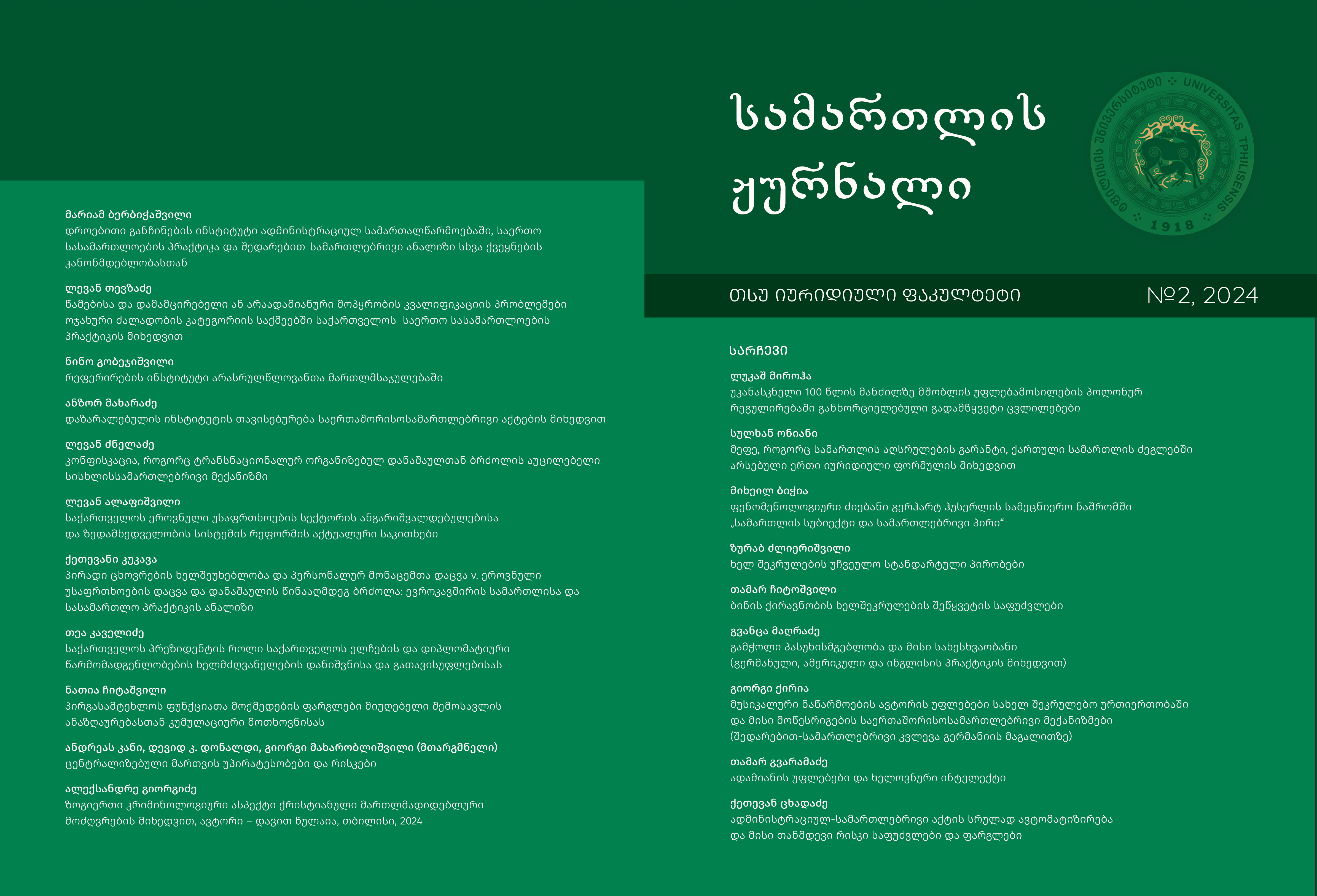ადმინისტრაციულ-სამართლებრივი აქტის სრულად ავტომატიზირება და მისი თანმდევი რისკი
DOI:
https://doi.org/10.60131/jlaw.2.2024.8324საკვანძო სიტყვები:
საჯარო მმართველობა, ადმინისტრაციული ორგანო, ადმინისტრაციულ-სამართლებრივი აქტი, ელექტრონული აქტი, ავტომატიზირებული აქტი, ხელოვნური ინტელექტი.ანოტაცია
ბოლო ათწლეულებია ტექნოლოგიურმა ინოვაციებმა მნიშვნელოვნად შეცვალა როგორც სახელმწიფოს ისე საზოგადოების ქცევა. შესაბამისად, ტექნოლოგიურმა განვითარებამ დიდი ზეგავლენა მოახდინა საჯარო მმართველობის საქმიანობის პროცესებზე, ვინაიდან ტექნოლოგიების განვითარება და მათი ინტეგრირება დიდწილად დაკავშირებულია ელექტრონული მმართველობის საჭიროებებთან[1]. პროცესების გაციფრულება, ელექტრონულ ფორმებში გადასვლა და რიგ შემთხვევებში ავტომატიზირება აუცილებელიც კი გახდა. მნიშვნელოვანია, რომ გაციფრულების და ავტომატიზაციის პროცესი ერთმანეთისგან დამოუკიდებლად იქნას განხილული, ვინაიდან, დიგიტალიზაცია იგივე ციფრული მმართველობა, მნიშვნელოვან წინაპირობას წარმოადგენს საჯარო მმართველობის პროცესის ავტომატიზაციისთვის[2].
სტატიაში გაანალიზებულია, რამდენად აკმაყოფილებს ავტომატიზირებულად მიღებული გადაწყვეტილება ადმინისტრაციულ-სამართლებრივი აქტის მოთხოვნებს და რა გავლენას ახდენს სახელმწიფოს ავტომატიზირებული ქმედებები პროცედურებზე და მის ძირითად პრინციპებზე. სტატია ეხება ავტომატიზირებული წარმოების მნიშვნელობას და მის საფუძველზე ადმინისტრაციულ-სამართლებრივი აქტის გამოცემის ფორმებს, ელექტრონულ და ავტომატიზირებულ აქტების განმარტებებს და განსხვავებას მათ შორის. განსაკუთრებული ყურადღება ეთმობა ადმინისტრაციული ორგანოს მიერ გამოცემული სრულად ავტომატიზირებული აქტის სამართლებრივ პრობლემებს და გამოწვევებს საჯარო მმართველობის განხორციელების პროცესში, მის კონსტიტუციურ-სამართლებრივ საფუძვლებს.
[1] ელექტრონული მმართველობა, იგივე ციფრული მმართველობა დაკავშირებულია საჯარო მმართველობით სფეროში ინოვაციებისა და ტექნოლოგიების დანერგვასთან.
[2] Tskhadadze K., E-Government Implementation on the Example of Georgia, TalTech Journal of European Studies, 14(1), 2024, 254.
წყაროები
General Administrative Code of Georgia, 15/07/1999.
Law of Georgia on Electronic Document and Electronic Trust Services, 10/05/2017.
Relevance of Constitutional-Legal Principles for Administrative Law, Journal of Administrative Law, No. 2, 2016.
Tskhadadze St., Good Governance – Constitutional Guarantees of Basic Rights in the Framework of Constitutional Reform in Georgia, Journal of Constitutional Law Review, 2017.
Administrative Procedure Act, 25/05/1976.
Braun Binder N., Dispositions of the machines in individual cases – dystopia or future administrative everyday life? ZSR/RDS Volume 139, I Issue, 2020.
Glaser A., Der elektronische handelnde Staat, E-Legistlation, E-Governance, E-Justice, Zeitschrift für Schweizerisches Recht, Volume 134, II, 2015.
Denk M., News on Digitization in Administrative (Procedural) Law, The present written version basically corresponds to the lecture of 4.11.2021.
Herold V., Democratic Legitimation of Automatically Issued Administrative Acts, Dücker & Humboldt, Berlin, 2019.
Ludwigs M., & Velling A., Fully automated administrative acts in German law. In Digitalization as a challenge for justice and administration= La digitalizacion como reto para la justicia y la administracion= Digitalization as a challenge for justice and administration. Würzburg University Press, 2023.
Maurer H., Waldhoff C., General Administrative Law. Munich: CH Beck, 2006.
Martini M., & Nink D. When Machines Decide...-Fully Automated Administrative Procedures and the Protection of Privacy, Neue Zeitschrift für Verwaltungsrecht-extra, 36(10), 10, 2017.
Polomski R.M., The Automated Administrative Act, The Administration on the Threshold of Automation to Information and Communication Technology, Duncker & Humboldt, Berlin, 1993.
Rechsteiner D., The algorithm has. Constitutional and administrative law aspects of automated individual decisions, Jusletter of 2019 16 Nov. (8).
Siegel T., Electronic Administrative Action – On the Effects of Digitization on Administrative Law. JURA Legal Education, 42(9), 2020.
Tskhadadze K., E-Government Implementation on the Example of Georgia, TalTech Journal of European Studies, 14(1), 2024.
ჩამოტვირთვები
გამოქვეყნებული
როგორ უნდა ციტირება
გამოცემა
სექცია
ლიცენზია

ეს ნამუშევარი ლიცენზირებულია Creative Commons Attribution-ShareAlike 4.0 საერთაშორისო ლიცენზიით .









